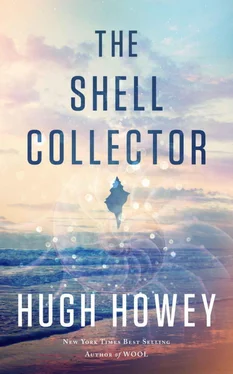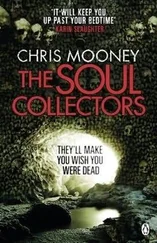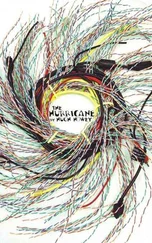“You understand this doesn’t change what I write about your father. Or you.”
“Of course. Do you take cream or sugar?”
“Black is fine,” I say. Strands of my hair have come loose from my running, from the wind. I tuck these behind my ear and accept a cup of coffee. Ness sits. We are back where we started, except the stars are out and the view of the beach is gone. The lighthouse whirs in the distance.
“Four generations of oil men,” I say. Ness nods. “Help me understand how… how you aren’t all the same.”
He laughs. “Because it’s a better story and much easier to write if we’re the same. But let me start from the beginning.” He glances at the dive watch on his left wrist, possibly wondering how much time he has, what things to leave out.
“Please,” I tell him. I’m sure I won’t hear anything new, but I look forward to what things he chooses to leave out, where he decides to embellish. And I’m in no shape to drive. No shape to confront him with the shells. It might have to wait until tomorrow. I’m going to have to take him up on the offer to come back.
“My great-grandfather William built Ocean Oil from scratch,” Ness says. “He worked on deep sea rigs while he was in his teens. Dropped out of high school after ninth grade, ran away from home, and became a roughneck on a Shell Oil platform. By the time he was twenty, he was a shift foreman. At twenty-two, he had his own rig. This was ten years younger than anyone in company history.”
“Because of your great-grandmother, right?”
“No. Because he produced barrels like no other, and that was all anyone cared about. He met Shelly, my great-grandmother, after his promotion. I know… that name, right? It was the most common name for both boys and girls at the time. A curse. She was eighteen, and accompanied her father on a rig inspection.”
“And her father was CEO of Shell Oil at the time—”
“Shelly’s father wasn’t CEO yet, just VP of Engineering. One of my dad’s biographers got that wrong, and he got the timing wrong as well. Everyone keeps repeating the same wrong source until it’s gospel.”
I make a note of this.
“By the time William—I only ever knew him as Paps—and Shelly started dating, Paps had his own rig. It wasn’t some kind of favor to him. He earned everything he ever got. If anything, the rig got him that first date, not the other way around. The story is that Shelly fell in love with him at first sight. Saw this young man ordering around people twice his age. He was covered in grime, refused to wear a hardhat but cussed out anyone who neglected theirs, used to say God made his head plenty hard enough.”
“That’s the kind of detail I wish I’d had a week ago,” I say. “I reached out to your publicist several times—”
“And if she ignored your inquiries, she earned every penny of what I pay her,” Ness says.
Until I ran the story you didn’t like , I think to myself. But then I have to remind myself that the story I ran isn’t the one he’s worried about. It’s the next one.
“So your great-grandfather was climbing the ranks pretty fast. He had his own rig, was dating a VP’s daughter. But then he leaves the company.”
“A few years later, yeah.”
“Seems abrupt. He was twenty-five at the time?”
“A few years can be a long time,” Ness says.
I think of the years Ness has been a recluse and wonder if he’s speaking from experience. I wonder exactly what he’s been doing with his time. Surely not sitting idle. Maybe he spent that time perfecting the shells in my bag.
“A lot happened during those years,” Ness says. “Look—” he glances at his wristwatch again. I touch the screen of my phone to wake it up, make sure it’s still recording. “My great-grandfather saw the future of drilling at a young age. He was ambitious. Driven. He had good ideas for getting at oil that no one thought we’d ever reach. He could’ve worked his way up the company. He was young and smart and determined, probably would’ve been CEO of Shell before he was forty. Instead, he quit his job, filed a few patents, and started begging for capital to start his own company.”
“Which didn’t go so well.”
“No. It didn’t.”
“And your great-grandmother Shelly, how did she take this?”
“The two of them were married on an oil platform by a roughneck who’d been an army chaplain. Shelly’s father was CEO by then, and he said never come home again, and Shelly didn’t. Paps managed to borrow enough to buy an old platform that wasn’t producing. He spent five years refitting it and drilling where people thought he was crazy to drill. The story goes that the tugs sent to repossess the rig were throwing lines to haul the thing away when he struck a gusher. Five miles down. Nothing like it had ever been done before. Of course, he would have a dozen platforms running within a year of that day. And he made it a point to buy every one of the tugs sent to repossess his rig.”
Wilde sips his coffee. The sky throbs with the light from the lighthouse. I don’t know how he lives within range of a metronome like that.
“Paps gave us the world, you see. From his son to my father to me. He gave us the world, but he broke it before he handed it over. That’s his legacy. He gave me and my dad the world in a million little flooded pieces. If I remember anything else about him that’s not in the history books, I’d rather not say.”
“To protect him? Like your grandfather?”
Wilde laughs. “Yes, because whatever I say wouldn’t be kind.”
“Tell me about your grandfather, then.” I make a show of turning the recording app off, show him my phone, thinking all the while of the FBI wire. “Off the record. I swear.” Off my record. I swear.
“I’ll take your signature over your swear any day of the week,” Ness says.
“You have both.”
Wilde stares into his coffee. I take a sip of mine.
“What was he like? From your reading, if not your memory.”
“My grandfather was a complicated man. I like to say that he walked in his father’s shadow, but with a flashlight.”
“To dispel those shadows?”
“To erase him in a way, yes. By the time my father inherited Ocean Oil, my granddad was already blaming his father for destroying the world. It wasn’t just Ocean Oil, of course, but you couldn’t tell my granddad that. Sea temps were up five degrees and sea levels eight inches from when my great-grandfather was born.”
“Everything I’ve read said the company bypassed your grandfather because of his age. Because of lack of interest.”
“And I showed you the real reason.” Ness indicates the leather journal sitting on the coffee table. “My grandfather wanted to dismantle Ocean Oil—”
“And that was why your father inherited the company instead?”
Ness nods.
I make a mental note of this. This is not the history anyone else knows. The popular accounts are of an unchanging and evil empire, handed from father to son, each of them perfectly like the other. A convenient tale, because it’s easy to understand. We can transfer our ire from one generation to the next, no forgiveness required, no need to get to know a man. Just judge him by his father’s sins.
Studying Ness, I allow myself to consider for a moment that I’m wrong about him as well, that he has nothing to do with the fake shells. Maybe the person I think I know is just a caricature of the real man. I’ve sensed this before with other celebrities and political figures I’ve gotten close to, that they’re just people saddled with unachievable expectations. We make of them what we need them to be, good or ill.
“So your father was supposed to keep the company safe,” I say. “But then he was the one who nearly tore it apart.”
Читать дальше












